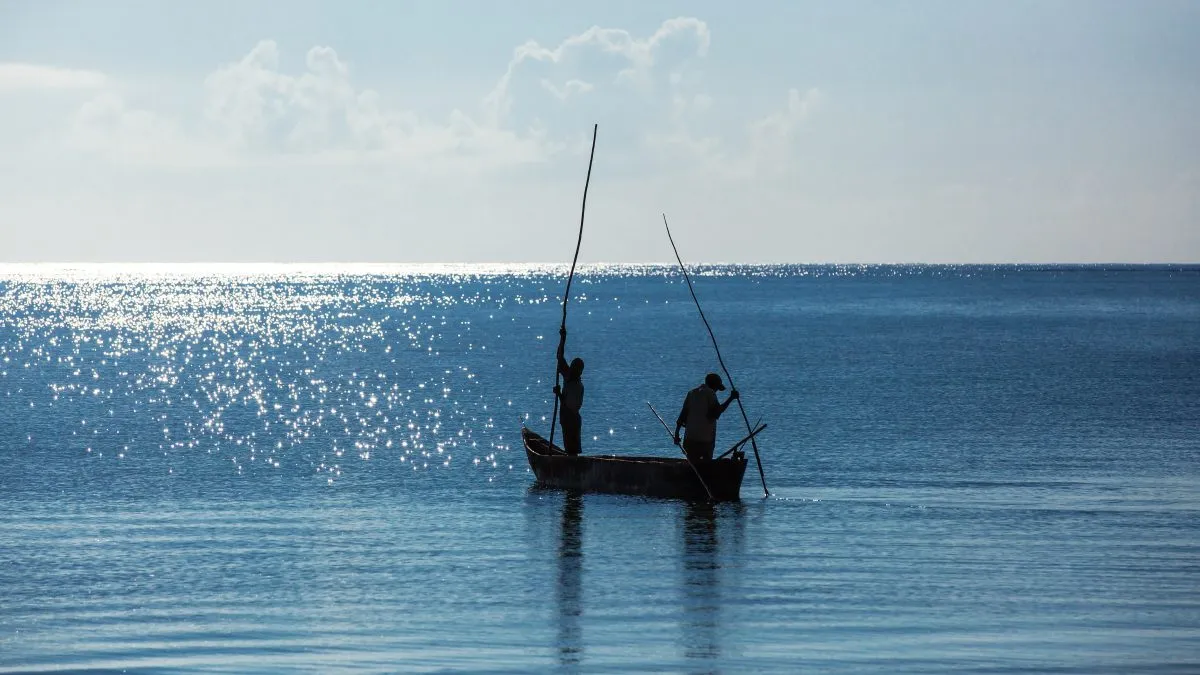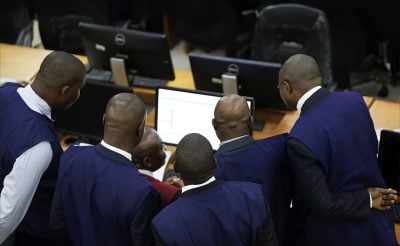Rising sea levels, high ocean temperatures, cyclones, floods, and increased seawater salination have caused the continent loss of lives and livelihoods, hunger, malnutrition, loss of property, and human displacement every year, especially hitting the continent’s coastal communities.
In recognising the urgent need for action to counter these effects of climate change, the Great Blue Wall (GBW), an initiative that has been at the forefront of fostering Africa’s blue economy, climate adaptation and resilience, was born at COP26 in 2021 in Glasgow, Scotland.
Western Indian Ocean (WIO) states comprise the Eastern African coastal nations of Somalia, Kenya, Tanzania, Mozambique, South Africa, as well as the island states of Comoros, Madagascar, Mauritius, Seychelles and the overseas French territories of Mayotte and Reunion.
These nations, in partnership with the International Union for Conservation of Nature (IUCN) launched the GBW as a network of marine and coastal conserved areas to benefit biodiversity and local livelihoods and empower communities to become stewards of the ocean.
It is a movement that was basically launched to conserve and restore marine and coastal biodiversity while harnessing the development of a regenerative sustainable blue economy.
The GBW is modelled on Africa’s Great Green Wall, which was established in 2007 to combat desertification in countries like Burkina Faso, Djibouti, Eritrea, Ethiopia and Mali.
Nassim Oulmane, chief of green economy at the Technology, Climate Change and Natural Resources Management Division of the UN Economic Commission for Africa, says the WIO region hosts pristine coral reefs, carbon-rich mangrove forests, and sheltered seagrass beds. This supports an abundance of marine life including important fish species, sharks and rays, turtles, sea birds, and marine mammals.
However, due to climate change and other factors, Oulmane explains, the deterioration of the WIO ecosystem is accelerating, creating dramatic impacts for biodiversity, as well as human societies.
“Threats are mounting from unchecked coastal development; mangrove deforestation; illegal, unreported, and unregulated fishing; shipping traffic; resource overexploitation; destructive fishing practices; unregulated tourism; oil and gas exploration; and heavy-sands mining,” Oulmane notes.
The GBW is geared towards creating a nature-positive African coast that enhances the resilience of societies in reversing nature loss by 2030.
The initiative seeks to create interconnected, protected and conserved marine areas to counter the effects of climate change and global warming in the WIO region, which is home to 38% of the world’s coral reef species.
The GBW also aims to unlock the potential of the blue economy to become a key driver of nature conservation and sustainable development outcomes in a time when only about 7% of the region’s coastal and marine environment enjoys some form of protection, according to the Western Indian Ocean Marine Science Association.
Ocean resources under threat
While the GBW initiative sets out to protect 30% of the ocean by 2030, overfishing, pollution, climate change and extractive industries are taking their toll on key ecosystems.
According to UNESCO, only around 5-8% of the marine area in the Indian Ocean is under some form of legal protection, which is way below the 30% target.
One study published by the University of Oxford in January indicated that Seychelles is choking under plastic debris that has accumulated on 27 sites on its coastline, with these plastics coming from as far as Indonesia, India and Sri Lanka.
In respect of climate change issues, Seychelles’ minister for foreign affairs and tourism, Sylvestre Radegonde, said last year: “Seychelles is not responsible for what is causing sea level rises, not at all, but we are suffering from it.”
Even the Aldabra Atoll, the world’s second-largest coral atoll and a UNESCO world heritage site, a special reserve in Seychelles, and home to the largest population of giant tortoises in the world, is imminently threatened by climate change.
To address this, the country’s President, Wavel Ramkalawan, pledged to protect 100% of his country’s seagrass and mangrove ecosystems by 2023 as part of the GBW initiative.
Mauritius, located in an active tropical cyclone basin, is already recording a faster sea level rise rate than global averages, while also facing accelerated coastal erosion and coral bleaching. To address this, the government has developed a 10-year climate policy.
But island nations continue to grapple with a funding challenge. According to Jean-Paul Adam, director in charge of Policy, Monitoring and Advocacy at the UN, such nations should be given priority in climate financing. “These countries often have to borrow at high costs and agree to frameworks not necessarily adapted to their needs. There are hardly any countries in the world that are as vulnerable to climate change as small island states,” he says.
Climate change is also expected to make life even harder for the inhabitants of the Comoros archipelago, one of the poorest countries in the world. But in June this year, the Moroni Declaration for Ocean and Climate Action in Africa was signed by members of the GBW.
It calls for a network of regenerative and inclusive coastal seascapes as part of the GBW initiative. It also calls for increased public and private investment in sustainable coastal and marine value chains, responsible fisheries, green infrastructure, ecotourism, renewable energies, and blue innovation.
Research and educational think-tank the Brookings Institution reports that artisanal and commercial fishing is critical for food security and the economy of the over-70m people living along the coast, while the region’s fishing contributes to 4.8% of the global fish catch, about 4.5 million tonnes of fish per year.
Marine assets in the Western Indian Ocean region are valued conservatively at $333bn and provide at least $21bn every year to the regional economy from marine and coastal tourism, carbon sequestration, and fisheries.
Deterioration of ocean ecosystems
A recent study by the IUCN, for instance, found that all coral reefs in the Western Indian Ocean are at high risk of collapse within the next 50 years. Reefs in island nations of the WIO region were, particularly, found to be under great threat.
On the study, Mishal Gudka, a senior scientist and programme manager at the Coastal Oceans Research and Development in the Indian Ocean (CORDIO), East Africa and a co-author of the work, indicated that the researchers detected overfishing of top predators on all the reefs from which they got their data.
CORDIO East Africa’s founding director, Dr David Obura, who is also the chair of the IUCN’s Species Survival Commission’s (SSC) Corals Specialist Group, and the lead author of the report, indicated that while it has previously been known that coral reefs are in decline, the research brought to the fore precisely to what degree.
The deterioration of these ocean ecosystems also has wider global implications. The IUCN notes that when the coastal ecosystems, which also extend to mangroves, salt marshes, and seagrasses are degraded at the global level, lost or converted, massive amounts of carbon dioxide (an estimated 0.15-1.02 billion tons every year) are released into the atmosphere or ocean, equivalent to about 19% of global carbon emissions from deforestation.
Since the launch of the GBW, two seascapes have been officially designated: the Tanga Pemba Seascape in Tanzania, an IUCN Category VI Marine Protected Area, and the Quirimbas Seascape in Mozambique.
“The GBW’s ambition is to protect two million square kilometres of marine areas, restore two million hectares of critical coastal and marine ecosystems, and thus help sequester 100m tons of carbon dioxide and create 1m blue jobs by 2030,” says Oulmane.
Through the initiative, Africa is presented with an opportunity to change its ocean protection narrative, as GBW represents the much-needed mindset shift in development. This will help in achieving a nature-positive world by 2030, making it a driver of natural regeneration, while unlocking its blue economy and sustainable livelihood opportunities and empowering local communities and stakeholders to become stewards of oceans.
This article was originally published in our sister magazine New African as part of a special report on Africa’s progress on the UN Sustainable Development Goals (SDGs) guest-edited by Antonio Pedro, acting executive secretary of the UN Economic Commission for Africa. To access more articles from the report click here.
Want to continue reading? Subscribe today.
You've read all your free articles for this month! Subscribe now to enjoy full access to our content.
Digital Monthly
£8.00 / month
Receive full unlimited access to our articles, opinions, podcasts and more.
Digital Yearly
£70.00 / year
Our best value offer - save £26 and gain access to all of our digital content for an entire year!

 Sign in with Google
Sign in with Google 



